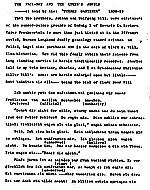
| The Will Family | Dogs | Pictures | Autobiography | OddManOut |
| Write to ROBIN@ROBINWILL.COM | ||||
The Will Family Pages: What's HereThanks to the Internet, we're developing new information all the time – and discovering that some of the things we took for granted are probably not true. We're presenting what we know, what we believe, and what we suspect, and we're trying to stay organized about it. |
• The ship EmmaFor starters, until recently we believed that 14 members of the Will Family had made the journey from Krugshof, in Bavaria, landing in Baltimore on October 12, 1839. Thanks to cousin Kris Osvold, we know that's not true. There were 32 people named Will on the Emma, which landed at Ellis Island. Here's a link to the names on the manifest. |
|
• Bayreuth, Bethel & Aurora – what we know so farWe are in the process of sorting out the duplicated baptismal documents that Uncle Clark secured in pre-Internet days. With so many of our ancestors named Johann, Leonhardt and Heinrich, it's easy to see how errors could creep in. The information as we understand it so far is here. |
|
|
• All roads lead to GastonIt is folly to think that personal histories ever wrap up neatly, but the story of John William and May and their children – not to mention grandmother Mary Adeline – leaves intriguing loose ends. One of them involves the number of times that the town of Gaston, Oregon, shows up in the family narrative. The name Moore appears slightly more often than coincidence might explain. Click here to read more. |
The Will Family Pages: What's Here:
The Will Family:
Bayreuth, Bethel, Aurora and Beyond
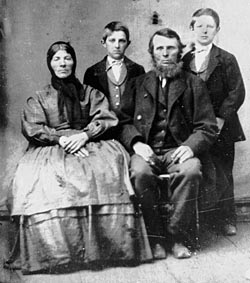
This may be the oldest photograph of the Will family in my collection. The adults are Christina and John Will, my great-great grandparents. The two boys are not positively identified, but are probably their two oldest sons, Alfred and John William.
Until recently, we had little reason to question the information we had from the pre-Internet research of Clark Moor Wier Will (1893-1982).
We believed that fourteen members of the Will Family had immigrated from Bavaria, and, though Clark's research, we could account for all of them. In fact, our current computer record contains more than 770 names of people descended from the original fourteen or connected through marriage.
Discovery of the manifest of the ship Emma by one of our kinswomen has changed our understanding dramatically. There were 32 people with the surname Will aboard the Emma. We're still trying to figure out how they were related to us, and where they ended up. We're hoping somebody -- maybe some of our long-lost kinfolk -- can help us!
The Fourteen: Muscatine County, Bethel
and Aurora
Let's start with what we know. What we thought we knew.
Three generations of the Will family, fourteen people in all, immigrated from Bavaria to the United States in 1839. Clark Will always said they found their way to the Pennsylvania Dutch communities of Bucks County, Pennsylvania, but if they did that, they did it quickly. The Emma landed on October 12, 1839; George Will was born in St. Louis in December, 1839, where the family was stranded by ice; and all of them were on a farm in Muscatine County, Iowa, according to the 1840 census. (Thanks to cousin Charlyn Mueller for that.)
The 1850 census shows all of them living in Bethel, Missouri, a communal society founded by charismatic preacher Wilhelm Keil. We don't know how the Wills found Wilhelm Keil. Perhaps they had kin or connections in the Rappite communities (Harmony, Economy, Phillipsburg) which were experiencing unrest at the time. Some members of those communities did join Keil at Bethel. However, it is known that Keil's missionary scouts reached Muscatine County, so perhaps the Wills were recruited in that manner. In any case, they joined Keil in Bethel and stayed, emigrating overland to Keil's new community, Aurora, Oregon, in 1863.
The first generation consisted of Johann 1762 (I use the dates of their births to distinguish between the Johanns) , a sister Margaret, and a brother, Wolfgang. There is no mention of Johann's wife. Johann was born in 1762 In Bavaria (Krugshof?), and died in Bethel, Missouri, in 1852.
The second generation included a Johann 1793, who was born June 3, 1793 in Bavaria, and who died in 1869 in Aurora. Johann's first wife was Susannah Dorothea Preuss; his second was Margaretha Elizabetha Friedlein. There is conflicting information about Susannah Dorothea: some records indicate that she died in 1829, but the 1850 census shows a Susannah Will living in Bethel with all of the children, while Johann lived elsewhere with his brothers. (I thank Mary Bardell for noticing that fact.) Johann was a stonemason.
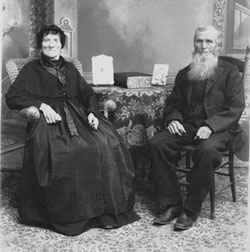
Christina Müller Will and John Will of Aurora, were my great-great-grandparents. The photo appears to be taken against the same backdrop as the one below, of their son John William and their grandchildren. John Will was born in Bavaria in 1818 and died in 1899, and Christina Will was born in 1823 in Bavaria and died in 1905, both at the home of their daughter, Otillia Will Wolfer, in Hubbard, Oregon.
The third generation of immigrants was comprised of the younger Johann's children John, also a stonemason, (pictured here in his old age with his wife, Christina Müller Will), Heinrich, Nicholaus, Leonard, Anna Susanna Dorothea, Urban, Catherina, Dorothea, and Anna Barbara. Their brother George was born in 1839 in St. Louis, Missouri. All of them remained close to the Bethel/Aurora communities all of their lives.
The Passenger Roster of the Emma:
The Fourteen We Knew About, and More!
| Name | Born | Age | Name | Born | Age | Name | Born | Age | Name | Born | Age | Name | Born | Age | ||||
| John | 1793 | 46 | John | 1796 | 43 | Nicholas | 1799 | 40 | Wolfgang | 1802 | 37 | Henry | 1806 | 33 | ||||
| Ann (Susannah?) | 1794 | 45 | Margaretha | 1802 | 37 | Margaretha | 1802 | 37 | Catherina | 1811 | 28 | |||||||
| John | 1818 | 21 | Catherine | 1823 | 16 | Henry ("Cap") | 1823 | 16 | Susan | 1832 | 7 | |||||||
| Henry | 1820 | 19 | John | 1829 | 10 | Christian | 1829 | 10 | Nicholas | 1834 | 5 | |||||||
| Nicholas | 1821 | 18? | John (George?) | 1831 | 7 | Christina | 1831 | 8 | Barbara | 1836 | 3 | |||||||
| Leonard | 1824 | 15 | Christian | 1833 | 6 | Elisabeth | 1838 | 1 | Magdaline | 1839 | 9 mo. | |||||||
| Susan | 1826 | 13 | Catherine | 1835 | 4 | |||||||||||||
| Urban | 1828 | 14 | Hans (John G.?) | 1839 | 1 | |||||||||||||
| Catherina | 1830 | 9 | ||||||||||||||||
| Dorothe | 1833 | 6 | ||||||||||||||||
| Ann (Anna Barbara?) | 1836 | 3 |
The Pack-Rat and the Queen's Jewels:
Does the story explain everything?
I am trying to imagine rounding up thirty-two of my kinfolk and making arrangements to immigrate halfway around the world. Most of the time, it's all I can do to organize a family reunion! Assuming they were agreed on the wisdom of leaving behind the pressures and politics of Bavaria, there remains the question of how they paid for their passage. It would be a big chunk of money now, and I doubt that it was a less significant sum by the standards of 1839.
We have a story entitled The Pack-Rat and the Queen's Jewels which might provide an answer, but there are problems. It consists of a short introduction in English, but the rest is in German, apparently a transcription from a boyhood memory of a story Clark's grandmother, Christina Müller Will, told him. Christina Will lived until Clark was about twelve years old (1905), and the typescript I'm working from is dated December, 1965. Although Clark's family spoke German at home until the first World War, he had no formal instruction in the language, so this document is a phonetic transcription of a sixty-year-old recollection of a Bavarian dialect that was probably current in the 1830s. Getting good grades in German at Portland State University in the 1970s did not prepare me to deal with it.
Here's the introduction. "That the brothers, Johann and Wolfgang Will, were caretakers of the summer-palace grounds of Ludwig I of Bavaria in Eastern Upper Frankenstein is more than just hinted at in the Pfframpt sealed, German longhand family geneology record written on folded, legal size parchment now in the care of Clark M. Will, Clan historian. How did this family obtain their release from long standing service is herein traditionally recorded. Stories told to my twin brother, Charles, and I at Grandmother Christina Miller Will's knees are herein enlarged upon but little -- Gott beheiten sie alle -- being the wish of Clark M. Will." (I wonder if he meant behalten.)
The German portion of the story begins with a man riding home on a dark and stormy night -- I'm not making this up -- looking as if he has seen a ghost. Beyond that I just skimmed, garnering the idea that the king's entire court was under suspicion of theft until an observant gardener noticed a packrat carrying an object that shot light and fire from its mouth . . . It takes ten double-spaced pages to tell the story. More than that, actually, because on page 10 the Hochfrau is interrupted mid-sentence as she is getting ready to explain the situation to the High King. I don't have the rest of the pages, so I can only guess how the story ends.
So here's the question: If your name is Will, or you are related to Wills, does the packrat story show up anywhere in your family folklore? And if so, do you have an English version to share?
The First-Generation Americans: My Great-Grandparents
The story of my great-grandparents and their children is not a happy one. The following based on an article I wrote for the April-May, 1997, newsletter of the Aurora Colony Historical Society. It is expanded by research done by my cousins, Charlyn Mueller and Kris Osvold, and bolstered by other photographs that have turned up over the years. The original article ran under the headline, "John William Will & Family: Recovered Portrait Recalls "Lost Generation."
By Robin P. Will
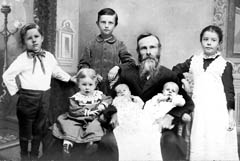
THE CHILDREN OF John William Will appear variously shocked, wistful and restless in this family portrait (above) dated August 21, 1893. Their mother, Lillah May Wier Will, had died giving birth to the twins three months before. John William himself was dead seven months later, his obituary citing “quick consumption” as the cause. John William Will was my great-grandfather; the children are, L-R, my grandfather Enoch Israel, Christine Agnes, John William, Jr., the twins Charles Moor Wier and Clark Moor Wier, and on the far right, Mary Adeline.
This faded portrait of John William Will and his children seems to be the only photographic evidence that there was ever a family at all.
The mother of the family, May Will, was gone three months before the photo was taken: she died the day after giving birth to the twins who rest in their father's arms. John William Will was dead eleven months later, his obituary citing "quick consumption" as the cause. The children were scattered like a litter of puppies.
Although the Will family arrived with the 1863 wagon train, and theirs is a prominent Aurora Colony name, this particular branch of the family seems to have disappeared with little trace -- except for Clark Moor Wier Will, the baby on the right, who became the unofficial historian of the Old Aurora Colony. He died in 1982 in Salem, Oregon.
There are few people now alive who can recall seeing any of these people, let alone remember their stories. What remains is the memory of tragedy, a hint of scandal, the mystery of an expatriate -- stories that dim with the passage of time.
This photograph resurfaced in the unlikeliest of ways. The child who went the farthest was the one who preserved these records of his past. Fina (Josephine) Bustamente, the daughter of the little boy on the left, brought this photo back to Oregon in 1994 when she came to visit her half-brother, Sanford Will, for the first time, and to meet the family her father had never forgotten.
Fina's contribution was the first step in creating the little family album seen here. With the portrait in hand, it was natural to wonder what had become of the other children. Other family members searched their collections to fill in gaps. As a result, it is possible to share what we know about this "lost generation" of the Will family.
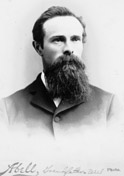
John William Will, 1849-1894
The father, John William Will
John William Will was born in 1849 in Bethel, Missouri, the son of John and Christina Müller Will, both of whom were born in Bavaria. John William owned a gun- and piano shop in Corvallis. He married May L. Wier in 1884; she died May 10, 1893. John had remarried by the time of his death: his obituary mentions a widow, and Benton County records (discovered by Hal Will), list a marriage on November 14, 1893 to Melissa Dickson. The Will family has no information about Melissa Dickson. John William died in Healdsburg, California while visiting his brother Alfred, on March 20, 1894.
John William Will, Jr.
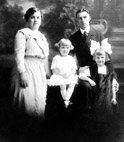 John William Will, Jr., 1885-1955, with his wife Martha and daughters Zelda and Leota,
John William Will, Jr., 1885-1955, with his wife Martha and daughters Zelda and Leota,
John William Will, Jr., was born June 10, 1885. It was always assumed that the younger John William went to his uncle Alfred Will in Healdsburg, California, but records suggest otherwise. Guardianship papers in the State Archives indicate that he went to the M. E. Johnson family of Drain, Oregon. By 1900, the census shows him living in Albany, Oregon, (at age 14) boarding at the Russ House (Hotel) and going to school. By 1910 he was in California, working as a plumber in Santa Clara County. He married Martha Lockhart (date unknown) and they had three daughters, Zelda, Leota, and Anola. Anola Will is still living in San Jose, California as of July, 2009. John William, Jr., was railroad stationmaster in San Jose, and he died there in 1955.
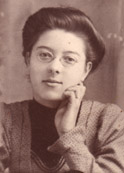
Mary Adeline Will, 1886-1903
Mary Adeline Will
Mary Adeline Will, born October 23, 1886, went to her maternal grandmother, Mary Adeline Moore, in Gaston, Oregon, after her father’s death. (The elder Mary Adeline had married Isaac Moore by that time, so her full name was Mary Adeline Moor Wier Moore!) Mary Adeline Will died on October 19, 1903, just days short of her seventeenth birthday. The story Fina Bustamente heard from her father (Enoch Will, Mary Adeline’s brother), was that Mary sneaked out of the house to attend a forbidden dance, got caught in the rain on the way home, and contracted pneumonia from which she never fully recovered.
Enoch Israel Will
The impatient-looking little boy on the left, Enoch Israel Will, was born October 21, 1888. Guardianship papers indicate that he went to his Grandmother Moore's home in Gaston, but the 1900 Census shows him living with the Allen Rogers family in Rickreall, Oregon, and going to school. His daughter Fina Bustamente, recalls him saying that he was frequently in trouble for running away, back to his Grandmother Moore. Although it is believed that he spent his teen years with his Uncle Alfred Will in Healdsburg, he returned to the Gaston, Oregon, area, and in 1915 he married Ruth Helen Fitch, a schoolteacher from Cornelius. They were divorced in 1927. The couple had two children, Sanford Wellington and Bertha Louise (Philpott). Sanford died in Portland, Oregon in 2001; Bertha (Betty) died in Hillsboro, Oregon, in 1984.
In the early '30s, Enoch changed his name to José Bustamente, a name he chose out of thin air, according to his daughter Fina, and went to work for Standard Fruit in Honduras as an engineer. He married Maria Hernandez in 1932, and the couple had three children. Don Carlos died in infancy; Josephine (Fina) and Sanford Will Bustamente are still living.
Jose Bustamente/Enoch Will returned with his family to Santa Rosa, California, shortly before he died in 1958. His widow, Maria, died in Dixon, California, in 2002.
Christine Agnes Will
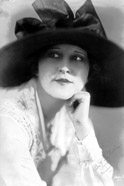 Christine Agnes Will, Miriam, 1892-1938.
Christine Agnes Will, Miriam, 1892-1938.Christine Agnes, March 26, 1892, went with Mary Adeline and Enoch to their Grandmother Moore, and later was adopted outside of the family. The guardianship papers filed with John William Will’s estate say she was adopted by W. A. Swope of Forest Grove, Oregon, but the 1900 Census lists her as an adopted daughter of Frank and Mattie Moore of Forest Grove. Her name was changed to Miriam.
Few specifics are known about Miriam. She was beautiful, she was talented as a singer (she sang at Enoch/Jose’s and Maria’s wedding), and she did something-or-other in show business. The photo reproduced here is dedicated, "To my brothers, love, Miriam," indicating, she was in contact with them as adults, and other evidence suggests she was always in touch with her birth family. Maria Bustamente was fond of her, and Velma Scholl recalled seeing her in the Scholl home in Hubbard (Velma’s mother, Sadie Wolfer Scholl, was a cousin to Miriam). According to Clark Will's records, she married five times and he lists four of the names: Hurd, Clifford, Monteil, Henscha. Miriam had no children. She and her husband died April 3, 1938 in Los Angeles of carbon monoxide poisoning, apparently (according to Fina Bustamente) a double suicide.
Charles Moor Wier Will
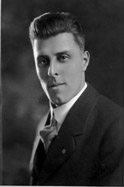 Charles Moor Wier Will, 1893-1927
Charles Moor Wier Will, 1893-1927Will family members have wondered how the twins got their names, but it’s not much of a mystery. Their grandmother, Mary Adeline Moor Wier Moore, was apparently in charge at the tragic (and no doubt chaotic) scene of the twins’ birth and her daughter’s death, and she didn’t need to look far for appropriate names. She named the boys after her brothers.
Clark and Charles Will were not yet a year old when their father, John William Will died. They were adopted by John's sister Otillia and her husband George Wolfer, and raised with the Wolfer children on their farm in Hubbard.
The 1920 Census, post-World War I, places both Charles and Clark in Seattle, working at the Navy Yard, but both of them returned to Oregon in the 1920s.
Velma Scholl, a niece of Charles and Clark, provided this reminiscence of Charles:
"Charlie was a deep and serious thinker He studied scientific subjects of the time, atoms, electronics, astronomy, etc. He was in contact by letter with professors in California who shared similar ideas and interest. When World War I came he was already employed in Seattle. His radio specialty was recognized and he was appointed radio instructor at Camp Lewis. After the war his first employer was Sherman Clay Co., Portland, in their radio department.
It was when Charlie, 33, came home to visit (May 28, 1927), that he undertook to top a very high fir tree in the proximity of the house. He was instantly killed when he fell, thus ending a promising life and career in his chosen field of science. The city of Hubbard gave him a service from the Armory.”
Clark Moor Wier Will
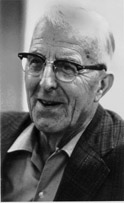 Clark Moor Wier Will, 1893-1982
Clark Moor Wier Will, 1893-1982Clark Moor Wier Will is remembered widely in the Aurora community. Growing up in the home of George and Otillia Wolfer, he learned as a child about life in the Aurora Colony, and in the early 1920's, he became convinced that he should make a systematic effort to preserve the story of the Colony -- an effort that occupied the rest of his life. He married Mary Huff in 1929, and had two daughters, Mary Margaret Corthell, who died in 2013, and Shirley Ruth Hall, who isstill living. Clark died in Salem, Oregon, in 1982.
Who Isn’t in the Picture
Two individuals who are not in this family photograph are present in the story, and it makes sense to include them here. The first is May Wier Will, wife of John William Will and the mother of his children, who died the day after she gave birth to the twins, Clark and Charles. The other is May’s mother, Mary Adeline Moor Wier Moore.
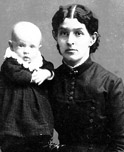 May L. Will, 1853-1893. Written on the back: Mother and Johnnie
May L. Will, 1853-1893. Written on the back: Mother and JohnnieAlthough Clark Will’s records refer to his mother as Lillah May Wier, her birth registration in Massachusetts lists her as “May Wier,” her gravestone reads, “May L.,” and she signed her letters, “May L. Wier.” We assume the L. stands for Lillah, but we can’t find it written down anywhere. May was born April 26, 1853, in Massachusetts, daughter of William Wallace Wier and Mary Adeline Moor Wier. She came to Oregon on the train in October of 1883 – we have the journal she kept on that trip. Her mother and one uncle were already here. The journal speaks of meeting John William Will in March of 1884, and they married June 11, 1884. She died May 10, 1893.
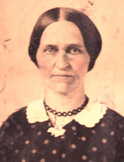 Mary Adeline Moor Wier Moore, 1820-1907
Mary Adeline Moor Wier Moore, 1820-1907Mary Adeline Moor was born in New York on January 11, 1820. She was the daughter of John Moor and Mary Davis Moor. She married William Wallace Wier in Hampden County, Mass., April 13, 1846. It is unclear what became of William Wallace Wier – there is record neither of divorce nor of his death, although two separate distant cousins claim that he died on October 25, 1886 in New York. The 1870 Census shows Mary Adeline living in Windham, Vermont, with May, but sometime thereafter she came to Oregon, probably to be near her brother, Charles Moor (who shows up on the tax roll of Polk County as early as 1853). Mary Adeline married Isaac Moore in Benton County, Oregon, on May 6, 1875. He died May 30, 1886. The Census of 1900 places her in South Tualatin Precinct, which would be Gaston, Oregon, living with Mary A. “Wills.” Her gravestone says she died at age 87 years, 11 months and 13 days, which means she died on December 24, 1907. By that time, she had outlived two husbands, her daughter, her granddaughter, and her brother, Charles. It’s not clear who was left to bury her. Her grave is in the IOOF Cemetery on Witham Hill in Corvallis, Oregon, near her daughter and granddaughter.
More questions …
Sometimes the answers to our questions serve only to raise more questions. My cousin Charlyn Hall Mueller – actually, my second cousin: she’s Clarks granddaughter, I’m Enoch’s grandson – acquired the probate records of our great grandfather Will in the summer of 2008. It is a thick file, and as of October, 2008, she’s still working her way through it. She immediately discovered contradictions to stories we had gotten from other family members and the information Clark had recorded. And of course we’re discovering that although we may know the whats of the matter, at least as they stood at the time John Will and/or his executors wrote them down, the whys may elude us forever.
The obvious question is about the fate of the children. At the time of his death, John William Will had four living siblings: Otillia (1853-1922), Alfred (1854-1930), George (1859-1944), and Edward Urban (1861-1944). We haven’t begun to count the cousins he had through his uncles Heinrich, Leonard, George, or, more distantly, Wolfgang, none of whom were farther away than Portland at the time of John William’s death. Otillia and George Wolfer adopted the twins; we believe but have no proof that Alfred was helpful to John and Enoch when they were older. Otherwise, members of John William’s family are absent from this story. That may have been clear to John William at the time of his death, because he appointed a great-uncle from his wife's family, Charles Moor, as “guardian of the person and estate of all my children.”
“The first guardianship papers were filed in June, 1894,” Charlyn writes. “Payments to Emma Nicholas for taking care of the twins start in August, although most of the time it looks like she just had Clark, although Charlie appears now and then. Mom (Shirley Will Hall, Clark’s daughter) says that Otillia took Charlie first, then couldn’t stand to have them separated, so she went back to get Clark. Upon further review, I think that John William, Jr., went to Persis Moor Linderman (Charles Moore’s daughter) until he was sent to Drain – a few months. Grandmother Mary Adeline Moore had the three middle children at first: Enoch, Mary and Christina. [From there] Christina was adopted by a family in Forest Grove. . . . I wonder how the Wills felt about basically ‘losing’ all these kids . . .”
We also wonder about John William’s widow, Melissa Kay Dickson Will (Kay was her maiden name, Dickson was the name of her first, deceased, husband). John William’s will states that the "household goods remain in possession of my wife and my children, while my wife stays with and takes care of the children, for their common use." That is an odd contingency for a wife, even a recent wife, as if John didn’t trust her to care for the children, which she had acquired so recently by marriage. (Odd, but perhaps accurate. There are stories, provenance unclear, that Melissa was a strange duck, a religious fanatic who preferred leafletting the town to staying home and caring for the children, and that neighbors were coming in to feed and change the twins. Shirley Will Hall got this from her father, Clark; but Clark was one of the twins, and it seems unlikely that he had the information firsthand.) There is a receipt signed by M. K. Will for, “goods and articles as my part of the property exempt from execution in said estate,” listing enough items to furnish a small house, and that may be all that Melissa got out of her short marriage to John William Will. (However, Charlyn hasn’t worked her way to the bottom of the file yet!)
This story will be continued.
Copyright © 2013, Robin P. Will, robin@robinwill.com, Rev. September 2013,
URL: http://www.robinwill.com
